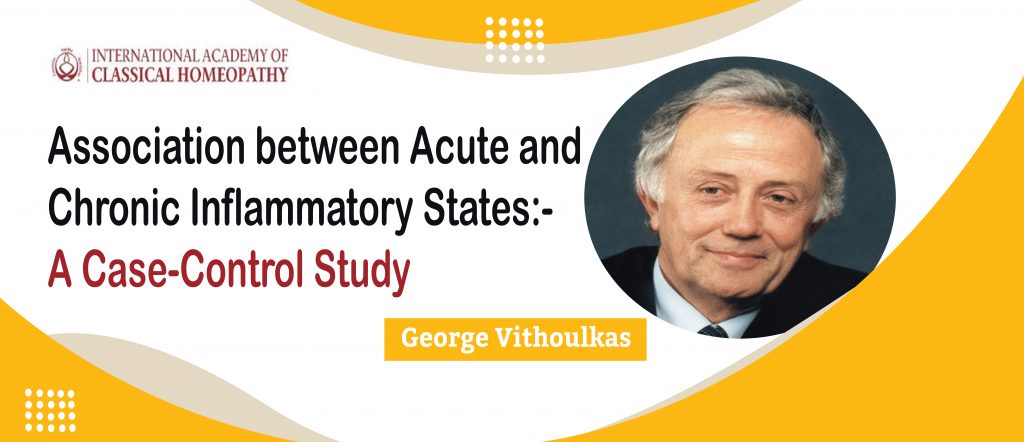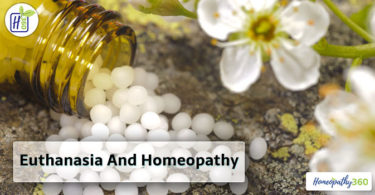
Abstract
Background Fever is the hallmark of efficient acute inflammatory response, which may be disrupted in chronic inflammatory conditions. The “continuum theory” proposes that the return of acute inflammatory states with high fever predicts improvement in chronic diseases during treatment. Our objective was to investigate the observation made, during classical homeopathic treatment, that such an association exists between chronic inflammation and efficient acute inflammation.
Methods In a case-control study, the reports of patients diagnosed with chronic inflammatory conditions with at least 6 months of follow-up under homeopathic treatment were retrospectively sampled from homeopathic medical practices from Greece, India, Romania and Russia. Twenty patients who improved under homeopathic treatment and 20 age-matched controls of those who did not improve were selected. The occurrence of common acute infectious diseases with fever during the follow-up period was investigated.
Results The average age of the cases and controls was 28.4 (SD: 16.64) and 27.9 (SD: 17.19) years respectively. 18/20 cases and 4/20 controls developed common infectious diseases with fever. Cramer’s V co-efficient value was found to be 0.551 (p < 0.01), indicating that improvement was more in patients with fever than without. Odds ratio of improving with respect to development of acute infectious diseases was 36.0 (95% CI: 5.8 to 223.5). The binary logistic regression model indicated significant contribution of occurrence of acute infections with fever as a predictor for improvement in chronic inflammatory disease.
Conclusions Classical homeopathic clinical observations indicate an association between chronic inflammatory status in the body and the ability to mount efficient acute inflammation. In this case-control study, the occurrence of common infections with fever during treatment heralded improvement in chronic inflammatory disease. Further powered studies are necessary to substantiate this finding.
Keywords
inflammation – fever – homeopathy
Introduction
Fever, a non-specific response, is a cardinal feature of acute inflammation.[1] Immunological studies have demonstrated the necessity and the importance of fever in efficient acute inflammatory response against pathogens.[2] Many studies indicate that the initial response, including fever, is necessary for the downstream resolution to occur.[3] [4] [5] [6] In states of compromised immunity, or when acute inflammation is excessive or deficient, the fever component seems to be missing or downplayed.[7] [8] [9] [10] [11] Often, hypothermia seems to be a defensive response in such cases.[12] Wrotek and colleagues have proposed and investigated the idea that the ability to raise fever is dependent on the glutathione level in the tissues. They demonstrate that both higher and lower glutathione, implying minimal and excessive oxidative stress in the body respectively, are associated with no fever generation during acute inflammation. It is only at moderate levels of glutathione that the organism is capable of producing fever.[13] [14] Therefore, in a chronically inflamed system experiencing excessive oxidative stress with altered glutathione levels,[15] fever may not develop during infections. However, with the resolution of chronic inflammation, this ability may return.[16] [17] [18]
Vithoulkas and Carlino proposed the “continuum theory”, where they emphasise the importance of high fever as the hallmark of an efficient immune system. They propose the absence or downplaying of this reaction as a sign of chronic inflammatory disease.[19] They also state that when chronic diseases begin to improve under homeopathic treatment, the return of simple acute diseases with high fever is a favorable prognostic indicator. This implies a return of the ability to mount an efficient inflammatory response, which they claim is lost during chronic inflammatory state.
This phenomenon was indeed observed in cases under homeopathic treatment.[16] [17] In a case series involving atopic dermatitis under homeopathic treatment, the skin clearance was strongly associated with reappearance of acute infections with fever, which had been absent since the onset of atopic dermatitis. The controls (atopic dermatitis cases not responding to homeopathy) showed no occurrence of acute infections with fever.[16] Further, in a case of anti-neutrophil cytoplasmic antibodies-negative glomerulonephritis, the patient was able to stop dialysis under homeopathic therapy. This improvement was associated with return of respiratory infection with fever, which was absent since the onset of renal failure.[17] A detailed exposition of a juvenile rheumatoid arthritis case with 17 years’ follow-up showed that the patient had recurrent acute infections typical of childhood before the onset of rheumatoid arthritis. The timeline shows absence of any such acute diseases with fever until the patient started to improve under individualised classical homeopathy. There was no relapse in the long follow-up period.[18] Some other previously published studies have reported the absence of fever associated with chronic inflammatory diseases such as multiple sclerosis and cancer.[20] [21] [22]
Based on these studies and theories, we intended to investigate this immunological finding at the level of clinical cases: that the onset of chronic inflammatory disease is associated with reduction in occurrence of common infectious diseases with fever. We hypothesised that a return of such infection and fever during treatment heralds improvement in the chronic disease.
The objective of this study was to investigate if such an association exists between chronic inflammatory state (chronic disease) and the ability to mount an efficient acute inflammatory response during infections, and whether improvement in chronic inflammatory state (chronic disease) is associated with increase in efficient acute inflammatory response with fever, as observed during classical homeopathic practice thus far.
Methods
We designed a case-control study, involving case records from multiple homeopathic medical practices, including three centres in India, two in Russia and one each in Greece and Romania. ‘Cases’ were defined as patients diagnosed of chronic inflammatory diseases, who had improved considerably compared with first intake assessment (as per clinical assessment or laboratory/radiological reports, as the case may be) under homeopathic treatment with at least 6 months of follow-up. From the same clinical database, patients diagnosed with chronic inflammatory diseases and who did not respond to homeopathic treatment, with at least 6 months follow-up, were separately sorted by age. From this latter list, an age-matched control was randomly selected for each of 20 improved cases from the respective age range.
The inclusion criteria were broad because the previous studies observed this phenomenon in most chronic inflammatory diseases. The included cases were deep chronic inflammatory diseases (neuropsychiatric, musculoskeletal, rheumatic, hormonal and metabolic disorders/diseases) with improvement status measured either by respective laboratory or radiological reports or, as in most cases, clinically through symptom severity and the general condition of the patient.
We collected data regarding the age, sex, main diagnosis, co-morbidities, follow-up period, improvement status of the chronic condition, and occurrence of any acute infectious diseases during follow-up, with details regarding high temperature for each of the cases and controls.
Statistical Analysis
The odds ratio was calculated to study the association of occurrence of common acute infections with fever and improvement in the chronic inflammatory disease (though this should not be interpreted as a causal factor for the return of acute infections). Correlational statistics were performed for the same association, and a binary logistic regression model was developed to check the contribution of acute infections with fever to the improvement status in chronic inflammatory disease.
Ethics
The original study was approved by the Centre for Classical Homeopathy’s Research Ethics Committee, Bengaluru, India, with waiver of patient consent. The approval number is PP/AS/01/19-20. The later smaller study from the same data, as reported in the present paper, did not require additional ethical approval.
Results
Data were collected from 40 patients, with 20 cases and 20 controls. The primary variable of focus was the status of improvement of the patients in relation to the occurrence of acute infections with fever during the follow-up period.
The characteristics of cases and controls are provided in [Table 1]. The mean age of the cases and controls was 28.4 (standard deviation [SD]: 16.64) and 27.9 (SD: 17.19) years respectively. The mean age of the total sample was 28.15 years (SD: 16.76).
Read More: https://www.thieme-connect.com/products/ejournals/html/10.1055/s-0043-1777119





